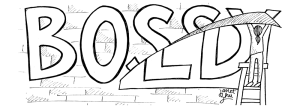
I spent last summer in India, running a nonprofit teaching program I started. I lived with my grandparents, who helped me with on-the-ground logistics. After getting into a contentious argument with my grandfather about a decision I had to make, I overheard him telling my grandmother that I was too opinionated, vocal and confident for a female.
While I did not take his comment to heart, I did realize that words have the power to shape our conceptions of the relationship between gender and leadership. Recently, I came across a campaign led by Lean In and the Girl Scouts of USA, called “Ban Bossy.”
The premise of the “Ban Bossy” campaign is that when young boys assert themselves, they are declared to be “leaders,” but when girls do the same, they risk being called “bossy.”
This translates into a loss of desire for girls to speak up and raise their hands in school, contributing to a confidence gap that starts early. In fact, between elementary school and high school, girls’ self-esteem drops 3.5 times more than that of boys. It is vital to change our language around leadership in order to get more women to want to pursue impactful roles.
When I ran for Georgetown University Student Association vice president this past February, it seemed like conversations about my candidacy were often colored by the fact that I was the only female candidate in the race. This frustrated me because while, yes, it was shocking and disheartening that several very qualified female students did not choose to run, I wanted the conversations about candidates to focus on the issues. I was torn because I knew that I represented a part of the Georgetown population that may not have felt represented by other candidates, but I yearned to be appreciated for my qualifications and not my gender.
I quickly realized that there is a larger cultural issue at play in many of these conversations. We shouldn’t only focus on the lack of women that pursue leadership in the American workforce; we should worry about the language we use to frame leadership and how it can reduce the ambition of qualified women.
Sheryl Sandberg has discussed the ambition gap extensively, explaining, “We teach women as young as four to lay back, to be communal.” By socializing young girls to bite their tongues when they feel like speaking their mind, we restrict potential.
Unsurprisingly, the largest ambition gap exists in politics. According to a study conducted by American University’s School of Public Affairs, young women are less likely than young men to have ever considered running for office, to express interest in a candidacy at some point in the future or to consider elected office a desirable profession.
This is attributed to three things: young men being more socialized by their upbringing to think about politics as a career path, women being less exposed to political information and men having more experience in competitive sports and thus developing a competitive desire to win. Most importantly, women do not perceive themselves to be as qualified, and women are less likely than men to receive encouragement to run for office.
Some may argue that we need more women in politics in order to advocate for “women’s issues.” But these issues affect everyone, not just women. We cannot afford to shut out of decision-making people that are qualified and have potential, just because of the language we use and the perceptions we have of gender and leadership.
Better representation will start only with the language we use to discuss women in leadership. Let’s describe ambitious women as “persuasive” instead of “pushy,” “dedicated” instead of “selfish,” and “bold” more than “bossy.”
OMIKA JIKARIA is a junior in the School of Foreign Service. She is vice president of the Georgetown University Student Association.



















